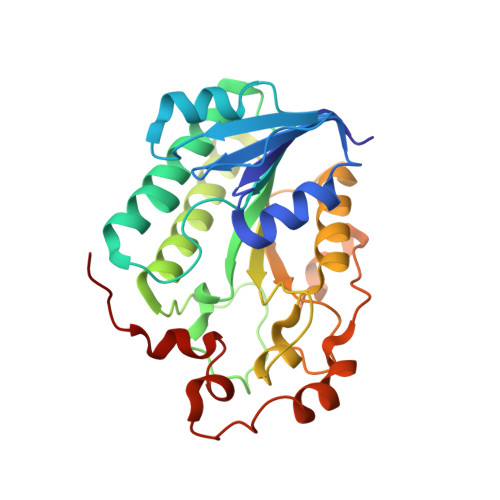Crystal Structure of Uronate Dehydrogenase from Agrobacterium tumefaciens.
Parkkinen, T., Boer, H., Janis, J., Andberg, M., Penttila, M., Koivula, A., Rouvinen, J.(2011) J Biol Chem 286: 27294-27300
- PubMed: 21676870
- DOI: https://doi.org/10.1074/jbc.M111.254854
- Primary Citation of Related Structures:
3RFT, 3RFV, 3RFX - PubMed Abstract:
Uronate dehydrogenase from Agrobacterium tumefaciens (AtUdh) belongs to the short-chain dehydrogenase/reductase superfamily and catalyzes the oxidation of D-galacturonic acid and D-glucuronic acid with NAD(+) as a cofactor. We have determined the crystal structures of an apo-form of AtUdh, a ternary form in complex with NADH and product (substrate-soaked structure), and an inactive Y136A mutant in complex with NAD(+). The crystal structures suggest AtUdh to be a homohexamer, which has also been observed to be the major form in solution. The monomer contains a Rossmann fold, essential for nucleotide binding and a common feature of the short-chain dehydrogenase/reductase family enzymes. The ternary complex structure reveals a product, D-galactaro-1,5-lactone, which is bound above the nicotinamide ring. This product rearranges in solution to D-galactaro-1,4-lactone as verified by mass spectrometry analysis, which agrees with our previous NMR study. The crystal structure of the mutant with the catalytic residue Tyr-136 substituted with alanine shows changes in the position of Ile-74 and Ser-75. This probably altered the binding of the nicotinamide end of NAD(+), which was not visible in the electron density map. The structures presented provide novel insights into cofactor and substrate binding and the reaction mechanism of AtUdh. This information can be applied to the design of efficient microbial conversion of D-galacturonic acid-based waste materials.
Organizational Affiliation:
Department of Chemistry, University of Eastern Finland, FI-80101 Joensuu, Finland.















